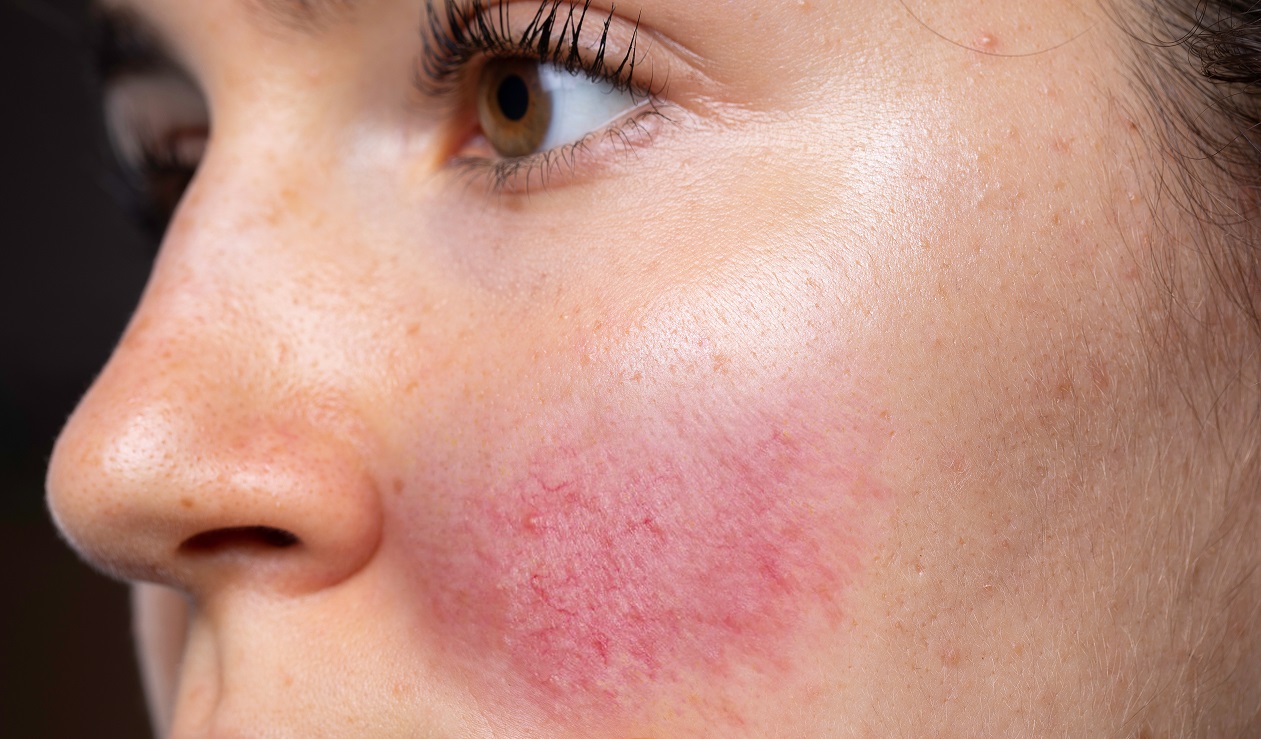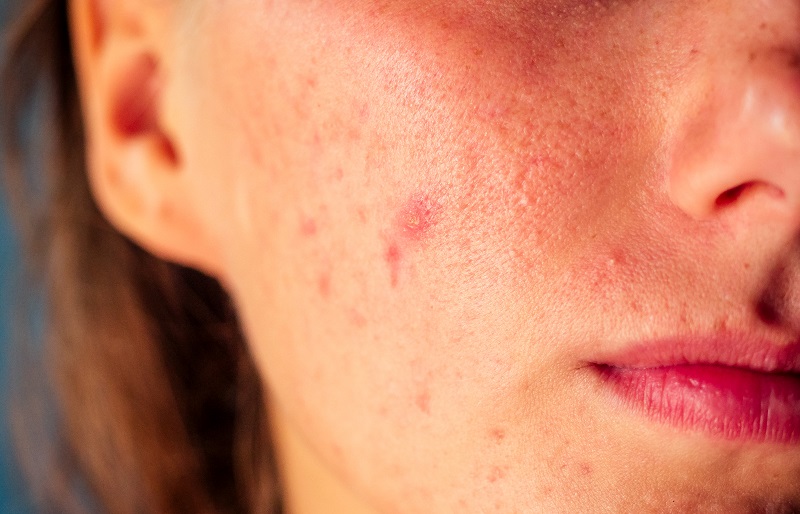Uncategorized
FACIAL ALLERGIES – HOW TO DEAL WITH THEM?
Facial allergy is a skin rash that causes itching, and discomfort. Depending on the severity, it could have negative impacts on the skin’s health and also our appearance if we do not know the right way to handle.
 (Facial skin irritation causes discomfort and affects appearance)
(Facial skin irritation causes discomfort and affects appearance)
Distinguish the different types of common allergies and learn how to deal with them to help you proactively protect your skin when unfortunately it comes to this.
1. Common types of facial allergies
Allergy due to weather
When the skin does not adapt to the quick changes in temperature or does not have good protection, it will create reactions such as rash, itching, the ability to quickly spread without early intervention.
Weather facial allergies usually occur when the temperature changes erratically, when the season changes from hot to cold, or vice versa.
Food allergy
Facial skin allergy happens due to food when eating foods containing allergens to the body’s immune system should produce skin reactions such as itching, skin angioedema.
Some foods to watch out for are seafood (shrimp, crab, crab, fish, …), vegetables like bamboo shoots, mushrooms, protein-rich foods like eggs, red meat, and greasy foods.
Cosmetic allergy
The habit of using a lot of skin care products and many different types of makeup at the same time causes the skin to become blocked. The skin loses the ability to absorb, causing allergies on the skin. Besides, choosing the wrong product ingredients is also the cause of skin allergy.

(Choosing the wrong ingredients for skin care causes facial skin to be allergic)
The use of products of undefined origin, high amount of corticosteroids such as creams and counterfeits, also makes the skin thinner, damaged and prone to allergies.
Allergy caused by the body system’s reaction
Some people with sensitive terrain from childhood or inherited by parents will be more prone to facial skin allergies than normal people. Because the skin of these people is often weak, the immune system of the skin is not good, so even a small agent from the outside can be allergic.
People with atopic skin need to be especially careful in the process of skin care, food choices and proper skin protection to minimize allergies as possible.
2. Distinguish skin allergies and skin reactions caused by skin care products.
2.1. Distinguish allergic skin
Allergic skin due to many different factors, it is necessary to clearly distinguish each one in order to have a safe and effective skin allergy treatment.
Signs of a food allergy
- Hives.
- Itchy throat.
- Swelling of lips, tongue, eyes, face.
- Weep.
- Wheezing.
- Manifestations of anaphylaxis.
Signs of an allergy caused by an insect
- Large-scale swelling (edema) at the site of an insect bite
- Itching or hives all over the body.
- Cough, chest tightness, wheezing, or trouble breathing.
- Manifestations of anaphylaxis.
Signs of drug allergy
- Itching, urticaria.
- Swelling of the face.
- Runny nose.
- Wheezing, difficulty breathing.
- Abdominal pain, diarrhea.
- Manifestations of anaphylaxis.
2.2. Distinguishing skin reactions due to skin care ingredients
Cosmetic allergy is skin rashes, urticaria, itchy papules, pustules,… when in due to ingredients in cosmetics. Usually, the skin would improve after 1-2 days after stop using cosmetic or skin care products which cause the allergy. However, in some severe cases, cosmetic allergies can cause severe inflammation, skin inflammation, pustules, thinning, dry skin, etc.
Signs of mild cosmetic allergy
Cosmetic allergy is very common. Signs to recognize this include:
- Mild red and itchy facial skin: Facial skin feels hot, red, and stinging.
- Pimples: The size of small pimples is different, usually tiny pimples, sometimes pimples, blisters, or possibly cysts. Cosmetic acne can appear immediately or after 1-2 days.

- Excessive oily skin: The skin increases oily, sebum production than usual, making the face more prone to acne.
- Inflammation, urticaria: The allergic skin will appear red and swollen on a large area.
- Dry, flaky skin: Dehydrated, dry, flaky, scaly skin, loss of aesthetics.
- Skin pigmentation: When suffering from a cosmetic allergy, the damaged skin is susceptible to sunlight, especially UV rays, which produce chemical reactions that form dark spots or white spots
Signs of a severe cosmetic allergy
The mild cosmetic allergy, if not overcome in time, will quickly turn into a severe stage with the following signs:
- Skin ulcers
- Skin burns
- Inflammatory pimples
- Premature aging: Peeling, dull skin, appearing wrinkles and dark spots, freckles.
- Anaphylaxis: This condition occurs when too many skin care products with harmful ingredients are tolerated at the same time.
According to experts in Dermatology, allergenic ingredients such as parabens (preservatives), mineral oil / paraffin (mineral oil), perfume (flavoring), lead, alcohol, …
3. How to treat skin allergies.
3.1. Treated at home in simple ways.
Caring, restoring skin. When the skin is allergic, it means the surface of the skin has been damaged and is very weak, just a small harmful agent makes the skin more serious, this time letting the skin “relax”.

(Skin care with mild products to help the skin recover from allergies)
- Temporarily say “no” to beauty cosmetics, this is the time when the skin needs rest rather than living with chemicals. Keeping the skin clear will help to quickly relieve the symptoms of redness and swelling.
- Clean your face by using cotton to get a moderate amount of saline on the skin, use the same toner as step, then rinse your face with clean water. Physiological saline helps to fight inflammation, removes dirt and bacteria on the skin effectively.
- Pay attention to use sunscreen to protect the skin before going out, because at this time the skin is weak, sensitive and very easy to catch the sun.
- Wash your face with herbs with good anti-inflammatory properties such as ginger, lemongrass, and lemon leaves to clean pores, prevent damage from spreading.
- Drink plenty of water, add foods rich in vitamins and minerals for the skin such as green vegetables and fruits to strengthen the skin’s immune system, protect the skin better.
Natural masks to overcome facial allergies
Natural masking helps to quickly relieve allergy symptoms on the skin and provides additional nutrients to nourish the skin becomes more smooth.
Aloe Vera: Aloe vera contains glycoprotein that inhibits histamine reactions and rapidly relieves allergies. At the same time, aloe vera also has anti-inflammatory, antibacterial and restores skin properties after damage.

(Natural mask from aloe vera helps to reduce facial irritation quickly)
Passion: Passion fruit has a cooling effect on the skin, reduces inflammation, and restores healthy skin, so it is very suitable for treating facial allergies. Just cooking bitter water to wash your face regularly will quickly improve allergic skin.
Oatmeal: Oatmeal provides quick relief of itchiness, and is highly anti-inflammatory and antioxidant, and is recommended for facial allergies.
3.2. See your doctor
In case of severe and persistent allergic reactions, it is imperative to see a dermatologist to examine and use the drug as directed.
4. How to limit facial allergies
Understanding skin is the best way to help you take care of your skin effectively and avoid skin allergies.
Here are some tips to keep skin bright and beautiful, and effectively limit allergies.
- Determine your skin type and carefully check cosmetic ingredients before using. Should choose cosmetics with friendly ingredients, natural, low in chemicals and especially without corticosteroids.
- Keep the skin clean, dry and cool, away from dirt and moisture. When in contact with hazardous places, it is necessary to have protective equipment.
- Increase skin resistance by supplementing vitamins and minerals from dietary sources of green vegetables and fruits.
- Cleaning hands before touching the skin helps to reduce bacteria when contact on the skin surface.
- In particular, do not eat foods that can cause skin allergies, rash or urticaria such as seafood (shrimp, fish, squid …).

(Choose cosmetics with ingredients that are safe and suitable for the skin)
Facial Allergy is a fairly common disease. However, if not treated promptly, it can affect the skin’s health. Recognizing the signs and how to handle an allergy is essential to proactively protecting our skin.











